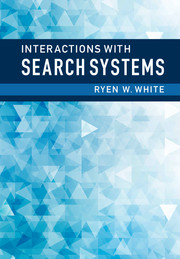Book contents
- Frontmatter
- Dedication
- Contents
- Preface
- 1 Introduction
- Part I Background
- 2 Collecting and Representing Search Interaction
- 3 Modeling Interests and Intentions
- 4 Models and Frameworks for Information Seeking
- Part II System SupportHelping People Search
- Part III Evaluation
- Part IV Opportunities and Challenges
- Notes
- References
- Index
- Plate section
4 - Models and Frameworks for Information Seeking
from Part I - Background
Published online by Cambridge University Press: 05 March 2016
- Frontmatter
- Dedication
- Contents
- Preface
- 1 Introduction
- Part I Background
- 2 Collecting and Representing Search Interaction
- 3 Modeling Interests and Intentions
- 4 Models and Frameworks for Information Seeking
- Part II System SupportHelping People Search
- Part III Evaluation
- Part IV Opportunities and Challenges
- Notes
- References
- Index
- Plate section
Summary
The theory and practice of information seeking has been researched extensively in the Information Science and Information Retrieval (IR) research communities. Many of the models of interests and intentions described in the previous chapter have foundations in this literature. As such, it is worth reviewing the research in this area and how it applies to next-generation search systems. Many models of search behavior that have been proposed are based on observations of how people search on their own and how they interact with intermediaries, such as reference librarians, during the search process. Indeed, the reference librarian model (of a human search expert trying to satisfy a patron's information needs) remains the prevalent interaction model in many search systems, including commercial Web search engines. The primary difference is that in these systems human librarians have been largely replaced by automation in the retrieval process (including formulating effective queries via tools such as query auto-completion, query suggestion, and backend query alterations), and by the searcher themselves (for example, in decisions regarding the relevance, filtering, and synthesis of the retrieved items) to generate a set of relevant information items, and ultimately, one or more answers to the questions that motivated their search.
Information-seeking behavior forms part of the broader field of Information Behavior, which includes both intentional information seeking (such as querying or actively browsing for information), and unintentional behaviors (such as passively watching a television commercial; see Wilson [1999]). Models of information seeking are informative for the design of search interfaces and behavioral models (for tasks such as click prediction, satisfaction modeling, etc.) that meet searchers’ needs and are representative of the types of actions that they perform. One such conceptualization involves different modes of information searching, reflecting different ways that people search for information. Table 4.1 summarizes these different modes as based on Wilson (1998) and Bates (2005), which varies how directed (goal-oriented) and how active the searcher will be during the information search process.
Research in areas such as exploratory search, information foraging, sensemaking, learning, creativity, and knowledge discovery, alongside more traditional models of information seeking (e.g., cognitive, strategic, process, episodic, and stratified models of search interaction), have covered many of the modes highlighted in Table 4.1. There are a number of theories and frameworks that have contrasted searching and browsing (Belkin et al., 1993; Marchionini, 1995).
- Type
- Chapter
- Information
- Interactions with Search Systems , pp. 97 - 138Publisher: Cambridge University PressPrint publication year: 2016
- 1
- Cited by



